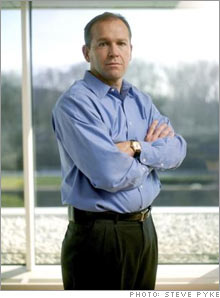|
Going down the talent drain Public companies are losing execs to deep-pocketed private firms.
(FORTUNE Magazine) -- Want to know how badly corporate directors are hurting their shareholders by bungling CEO pay? Consider a story that has captured the fancy of the business press: the tale of Dave Calhoun, America's hottest executive and a man who should be the highly paid CEO of a U.S. public company, but isn't. Calhoun was a GE (Charts) vice chairman and the most lusted-after managerial star who wasn't already a CEO, as we told you earlier this year (see "Star Power"). Headhunters couldn't leave him alone. Only he knows how many offers of top-tier CEO jobs he turned down, but they were numerous and included Boeing's (Charts). Finally, inevitably, he got an offer worth taking and in mid-August said yes.
But here's what didn't happen. He didn't take the helm of a giant publicly traded company, which is what everyone expected him to do. Instead he left the world's most admired corporation, where he was running businesses with $40 billion of revenue, to become CEO of a privately held Dutch outfit called VNU, which owns the A.C. Nielsen research business, Billboard magazine, the Hollywood Reporter, and other media properties. Total revenues: about $4 billion. Why would he do that? Calhoun isn't commenting publicly beyond a prepared statement, but the answer seems obvious. It was money. Press reports valued his pay package at around $100 million, but its real value is uncertain because Calhoun is also making a substantial investment in VNU (no one is saying exactly how much). This innovative deal could bring him even more than $100 million (or less), depending on VNU's future performance. All that money is presumably for four or five years' work. When big buyout firms take a company private, as in this case, they typically do renovations for a few years and then take it public again, at which point the rehab team moves on. The most interesting question arising from this situation is: Why couldn't a huge publicly traded company make Dave Calhoun an offer he'd accept, but a small privately held firm could? Again, the answer seems obvious. In today's climate of deep shareholder distrust, no public company would dare to offer a prospective boss such munificent terms. In reality, plenty of unheralded companies are paying CEOs honestly and modestly for excellent performance, but a large group of lousy boards have poisoned the atmosphere. Consider the lingering effects of the Enrons and WorldComs, then add recent reports of megapay for poor performers like Pfizer's Hank McKinnell and Morgan Stanley's Phil Purcell, and top it off with the stock-option backdating scandal. It sure looks as if U.S. boards are addicted to overpaying. Any public company that now offered a new CEO $100 million would be scourged without mercy by shareholder activists and TV talking heads nationwide. Yet the Calhoun situation shows that sometimes an executive really is worth a staggering sum of money. Of course, Calhoun hasn't even started at VNU. So how do I know the deal makes sense? Because I know who made the deal. Calhoun is as sharp as anyone, and he was negotiating against people representing the Blackstone Group, the Carlyle Group, Kohlberg Kravis Roberts, and the other private-equity firms that bought VNU - collectively the smartest, toughest SOBs in business. Whatever deal they reached is the correct deal because it represents the market at its most efficient, ruthless best. Calhoun stands to make $100 million or more because cold-eyed investors with their own money at stake believe he's worth it. So here's where we stand. America's public companies have made such a mess of CEO comp that you might say they have a zero balance in their trust fund: Shareholders won't trust them to make a big-money deal for a CEO even in a case like Calhoun's, where it's perhaps justified. In the global war for talent, U.S. public companies are blowing their opportunity to hire the world's best managers. That's a historic shift. Shareholders may be paying the price for a very long time. |
|

